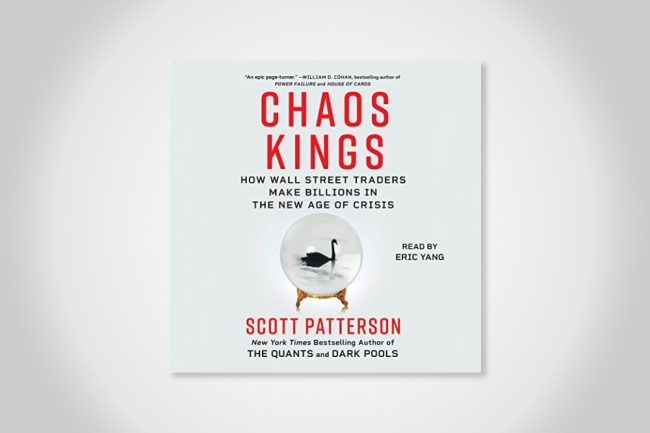You have /5 articles left.
Sign up for a free account or log in.

Simon & Schuster
Chaos Kings: How Wall Street Traders Make Billions in the New Age of Crisis
by Scott Patterson
Published in June of 2023.
Ever since I read Nassim Nicholas Taleb’s 2007 book The Black Swan, I’ve been fascinated by low-probability/high-impact events.
Chaos Kings, which features Taleb as one of its protagonists, both updates the story of how Black Swan thinking has expanded and been challenged and applies the idea of low-probability/high-impact events to finance.
While I think of Taleb as a professor and an author, much of his career has been spent as a trader. Chaos Kings tells the story of the wildly successful hedge funds that Taleb and his business partner Mark Spitznagel started to invest in using Black Swan thinking.
These hedge funds, the current one started by Spitznagel is called Universa, follow an investment strategy of making big bets on massive market volatility. If the stock market unexpectedly craters, with across-the-board valuation drops of 20 percent or more, Universa will realize enormous returns. On normal days when stocks move up or down incrementally, the value of Universa’s investments loses small amounts of money.
A hedge fund following a Black Swan strategy acts as a form of insurance. According to Spitznagel, large investors (such as university endowments, pension funds, high net worth individuals, etc.) only need to invest 3 percent of their portfolio in a Black Swan fund to protect their core assets. This strategy leaves much more money on the table to invest in equities, as the long-term upside of stocks is protected against extreme downside risk.
I have no idea if university endowment managers are clients of firms like Universa. I know that university leaders should be spending more time focusing on low-probability/high-impact events.
What if a college president thought more like Taleb and Spitznagel? How would this change her priorities, strategies and operations?
A college president enthusiast of Black Swan thinking would focus less on preparing her institution for known risks and more on being prepared to respond to unknown (but highly consequential) events.
She might ask, what are the plans that the university has in place should some external shock (extreme weather, a pandemic, etc.) make it impossible to continue with campus-based gatherings and face-to-face classes?
In these post-COVID days, it is easy to assume that: (a) Our institutions know how to deal with big emergencies like a public health threat; and (b) It is unlikely that something as big and disruptive as the COVID pandemic will come around again soon.
If you follow the logic of the Black Swan investors, both of these assumptions would be understood as flawed. They have built an investment philosophy around the idea that the timing and direction of low-probability/high-impact events cannot be predicted or avoided.
While reading Chaos Kings, my mind kept wanting to go to climate change. While the book spends some time on how investors think about (and seek to profit from) extreme weather events, I wondered if a Black Swan framework might help universities prepare for the effects of climate change.
What percentage of a university’s leaders’ time, and proportion of a university’s budget, should be spent on preparing for low-probability/high-impact events?
How can a college hedge against the worst effects of climate change, such as the possibility that extreme weather will cause the network to go down, the power to go out, the buildings to be flooded, and the fires to come?
Chaos Kings focuses on what Black Swans mean to the world of money. As the climate crisis drives ever more Black Swan incidents in our world of higher education, we should be spending more time and treasure preparing for the inevitability of the next low-probability/high-impact event.
What are you reading?








